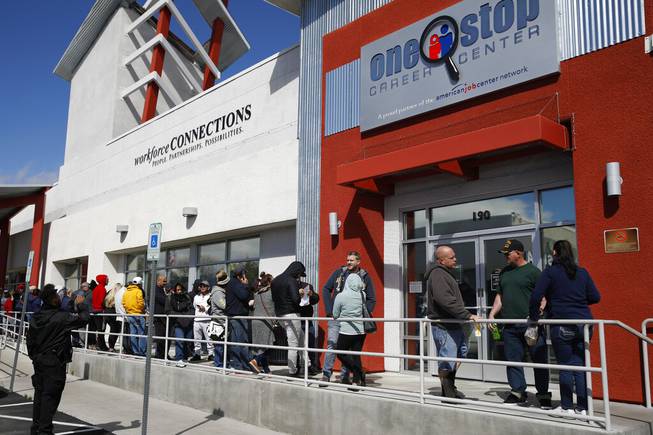
John Locher / AP
In this March 17, 2020 file photo, people wait in line for help with unemployment benefits at the One-Stop Career Center in Las Vegas.
Saturday, May 9, 2020 | 2 a.m.
While the state is entering the first phase of reopening its economy today, don’t expect unemployment numbers to immediately recover and companies to quickly rehire, Jonas Peterson, president and chief executive officer of the Las Vegas Global Alliance, told the Southern Nevada Regional Planning Coalition Thursday. He was one of several economic development experts to address the 10-member body consisting of local elected officials from the region.
The planning coalition voted 6-4 to disband in August, but the jurisdictions later realized that they did not have the authority to do so, said coalition member and Clark County Commissioner Tick Segerblom. Now, the body is back in place and in search of new direction, Segerblom said.
In the coming months and years, Southern Nevada should aggressively pursue new employers and businesses to reduce unemployment and bolster the economy, Peterson said. Economic leaders and elected officials could seize this opportunity to recruit firms, including those in industries not typically well-represented in Nevada, such as manufacturing and logistics, Peterson said.
“I believe there will be significant and unique opportunities over the next two to three years to create new, high-wage jobs for our residents if we can make sure we have the tools, the resources and the team in place to go after those opportunities,” he said.
Peterson said he is in contact with the Governor’s Office of Economic Development about the need to recover and diversify the economy during and after the pandemic. That effort appears to align with one of Gov. Steve Sisolak’s statewide goals as outlined in his coronavirus “Roadmap to Recovery” to “transform Nevada’s approach to governance, public health, education, and economic diversification.” Prior to the coronavirus pandemic, the economic development office was drafting a plan related to diversification, which will be repurposed in light of the pandemic, according to the “Roadmap to Recovery.”
Given the state of the economy, Peterson predicts that many businesses and startups will go out of business as the year continues, and that new ones could pop up to replace them. Those new firms will need somewhere to open up shop, and leaders in the state should try to bring them to Nevada, partly by offering them performance-based incentives, he said.
There also might be companies previously located abroad that will want to relocate in the United States in light of the pandemic, according to Peterson.
“There is some potential, huge opportunities out there if we can be aggressive over the next two to three years to capture those opportunities,” Peterson said.
Others who addressed the planning coalition included representatives from Las Vegas-area chambers of commerce, Betsy Fretwell, senior vice president of the technology company Switch, and Nancy Brune, executive director of Kenny Guinn Center.
While the planning coalition’s immediate goals have yet to be determined, the body could play a role in pushing forward regional economic projects or other economic recovery plans, Fretwell said.
“This group really has a place in this conversation going forward, in my opinion, about how this economy can shape up and how we can adapt going forward with these new and different resources,” said Fretwell, who previously served as Las Vegas city manager and said she was active in the precursor to the planning coalition.
As business leaders assess Nevada’s recovery needs, they might want to prioritize increasing the amount of grant funding and other resources the state receives from the federal government, Brune said.
Nevada ranks 48th out of 50 states and the District of Columbia in the amount of federal financial assistance it receives per capita, according to a Guinn Center analysis. The state also received fewer loans for small businesses than most of its neighboring western states through the emergency federal Paycheck Protection Program, Brune said.
Ranking 43rd in the nation when it comes to the number of state employees per residents, Nevada lacks an individual or body charged with securing federal assistance. Developing such a body could bring more resources to the state as it navigates the process for economic recovery, she said.
“There’s a lot of great energy and a lot of collaboration. I think we’ve got the elements for really taking advantage of the opportunities and building the new Nevada,” Brune said.
